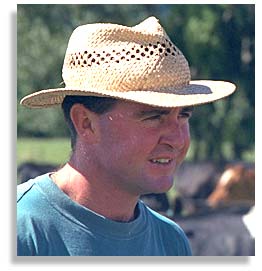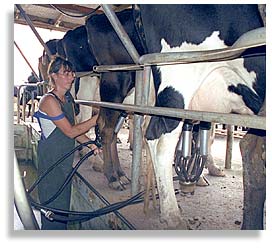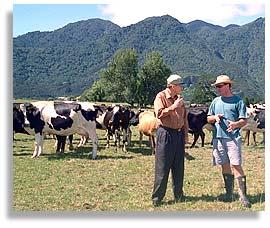|
A Guarantee of Safe Food
Organizing Organic Dairy Farmers
Waikato, Aotearoa / New Zealand
Russell Simmons is an organic dairy farmer in Waikato, New Zealand. He’s executive director of the Organic Dairy Producers’ Group. The organization educates farmers about the economics of sustainable food production and sustainable land management use; organizes farmer networking and the pooling of ideas and resources; and is developing the organic dairy industry. This interview is part of an extended series of articles and interviews gathered by In Motion Magazine in the context of the 2000-2001 hearings of New Zealand's Royal Commission on Genetic Modification. In Motion Magazine travelled around New Zealand with Missouri Rural Crisis Center and Natiional Family Farm Coalition president Bill Chrisitison visiting farmers and community leaders and listening to their views about genetically modified organisms. Currently there are no commercial GE crops in New Zealand. After hearing the recommendations of the commission the New Zealand government will make a decision on whether or not GE crops will be allowed in New Zealand. This interview was conducted February 14, 2001 by Nic Paget-Clarke. In Motion Magazine: What does it mean to be an organic dairy farmer? Russell Simmons: It means using biological natural tools that are already available, that we choose to use or that we choose to ignore. The natural systems, or biological tools are things like the microbes that we have in our soil. The soil on a conventional farm uses about one ton of microbes per hectare per year. In contrast, on an organic farm, we use about eight tons of microorganisms per hectare per year. Also, on a conventional farm, nitrogen is a limiting factor and farmers are continually applying it artificially. This application kills off the microbes and contaminates the water supply. On organic farms, through increasing and creating life in our soils we actually increase those levels of nitrogen by natural systems. We think that production will increase using biological farm systems’ organic methods and practices. In Motion Magazine: Why are you concerned about GMO’s? Russell Simmons: The reason is part of our organic certification to meet a market requires us to be free of GMO’s. For that very reason, of meeting the market, we can not afford to let GMO’s anywhere near our farming environment. In Motion Magazine: In addition to the impact on the market, do you think there will be other effects? Russell Simmons: We don’t know what the long term risks are regarding GMO’s, so we don’t want to see it in our food production system. There’s no long term records or testing done, so we would like to see those carried out first, quite comprehensively as well. What GMO’s try to achieve, organics can achieve under a good biological system. The insect resistance, the increase in production, the taste and the quality, can all be achieved through biological farming, organic agriculture.
Russell Simmons: Europe, America and Japan, other Asian countries. In Motion Magazine: Have they stated why they want your product to be GMO free? Russell Simmons: I think they’ve been hit with a few things. Chernobyl started it all. And then we have the mad cow disease. The markets want a guarantee of safe food. The two most used words in the marketplace are safe and sustainable. In Motion Magazine: And that’s particularly true for value added products? Russell Simmons: Yes. Value added niche marketing. Value added product. Speaking to the Royal Commission In Motion Magazine: You spoke at the Royal Commission hearings? Russell Simmons: Yes. In Motion Magazine: How did that go? Russell Simmons: For me, it was an intimidating experience, but I found the whole thing really quite exciting as well. It was a huge pooling, of networking from the organic industry. I think the outcome that we managed to put forward was positive. I was really pleased with the outcome. Considering that our resources were such that we had to fund ourselves to get down there and put ourselves up, while the scientists were paid a large amount of money for their submission and were flown down there with everything paid for - we were coming from different ends of the economic spectrum. In Motion Magazine: The organic industry is throughout the country? Russell Simmons: Yes. Throughout the country. In Motion Magazine: Do you meet as a business group, or more as a group of farmers who are trying to organize for political power? Russell Simmons: We run on three tiers. First, we run an information flow for farmers who would like to learn more about organic agriculture. Secondly, we run monthly meetings of farmers who have converted to organic farming or would like to convert next year. We do problem solving and confidence building, pooling resources, networking. And, thirdly, we run a business side. There’s a group of us who are trying to establish an organic dairy industry. In Motion Magazine: What role do you think the government ought to be playing? Do you think the hearings are a good idea? The whole concept of what they are doing - the moratorium, the possibility of not allowing GMO’s? Russell Simmons: I think the moratorium has to stay. I think the precautionary principle needs to be applied. We need to investigate and do a risk analysis first before we jump. Once we jump, it’s all or nothing. If we go with GMO’s, New Zealand will not benefit in a market sense or from a producer’s sense. GMOs only benefit science providers. In Motion Magazine: Do you think it is appropriate for the government to step in like this? Russell Simmons: I think so. Yes. From what’s happening in the international marketplace in GM trading, I don’t think it’s gone very well at all. New Zealand relies heavily on our agricultural exports so to put all of that at risk for the sake of a potential small gain is to risk a huge amount. In Motion Magazine: If the Royal Commission process hadn’t been put in place, the GMO’s would have just happened? Russell Simmons: This process began about 18 months ago when it made the headlines that we were consuming genetically engineered material in our food. We didn’t know about it and we didn’t have a choice about whether we wanted to eat it or not. There was a growing concern within the population. We didn’t like what was happening to our environment and to the food chain. We had no choice. We wanted to get some information. In Motion Magazine: What products were you concerned about? Russell Simmons: Soya and cornstarch products mainly. Also, there was something like a hundred and thirty experiments going on within New Zealand which we weren’t aware of. It was happening around us and we didn’t have a choice. There was a big public outcry. In Motion Magazine: Has the Dairy Board taken a position?
They are saying that because competing export nations, such as America, are lowering their cost of production through GE we need to adopt the same policy and lower our costs to stay internationally competitive. But what is actually happening in America is that the corn market has fallen over and there is a huge surplus over there. They can outsource cheap grains and produce milk at a cheaper cost. The reason that we can be competitive is our unit cost of production is so cheap that we can undercut everybody else. The fear is that if the Americans continue to lower their costs we’ll have to continue to lower ours and we can’t go too much further. In Motion Magazine: Why is it so cheap? Russell Simmons: Because we are pasture-based farmers. We use our environment and habitat to produce grass at a very low cost. Because of that we can produce milk at an extremely low cost as well. The cows do all of our harvesting and work for us, really. In Motion Magazine: Is that good planning or you have very nutritious grass, and lots of it? Russell Simmons: Both actually. There’s been an awful lot of research gone into farm efficiencies. We think that we are the most productive farmers in the world on a per hectare basis. Plus we have such a beautiful natural resource. We get a good rainfall. We’ve good reasonably high fertile soils and a relatively even growing climate as well. Our natural resource allows us to do it better than anyone else. The research has just fine tuned it. In Motion Magazine: Are New Zealand farmers mostly family farmers? Russell Simmons: Nearly all of it is family farms. But the corporate farms are coming in now. They have been for the last five years. In Motion Magazine: How are they moving in? Russell Simmons: In the South Island, there are big conversions. Up to 2,000 cows. The biggest I’ve heard is three and half thousand-cow farms. Family farmers cannot afford to buy that size - they cannot compete with that. It’s equity partnership farming. In Motion Magazine: What does that mean? Russell Simmons: Basically, they’ll set up a company and people can invest in dairy farming. A corporation goes out and buys the farm, puts managers on it to run it, and you have a share in it. It’s an investment. In Motion Magazine: I heard that in the ’80s the National government did away with subsidies. Can you tell me about that? What impact did that have on family farmers? Russell Simmons: What it did was it made us stand alone in the market. We became true unsubsidized food producers. We were having to farm at real cost, reality farming.What it did was it drove us to be efficient. We had to be profitable. So here we are now still being profitable and still being very competitive. In Motion Magazine: It was a good thing or a bad thing? Russell Simmons: What happens is you reach a point in time were the market driver, which was maximum production, reaches a maximum level and everything after that is diminishing return. We are at that point now. We have been there for the last five years. The next way to add profit to your business is to add value to your product. Instead of trying to produce bulk commodity, add value and niche market. In Motion Magazine: So that’s why you think going organic is the way to go. Russell Simmons: Absolutely. In Motion Magazine: Do you think that what they did in the ’80s was a good thing? Russell Simmons: I think it was. In Motion Magazine: Why? Russell Simmons: I suppose you could say that we are really independent of any government influence now. We don’t have our taxpayers telling us that they are supporting us. We are now a very profitable industry because of it. In Motion Magazine: What do you think is the significance of the hearings? Russell Simmons: What it is doing is it is getting an awful lot of information out that we would never ever had the opportunity to hear. We’re making the Life Science division come clean about some of the claims they are making.
Russell Simmons: The way I see it, the best strategic outcome for New Zealand would be to adopt a GE Free policy, just for the fact that 60% of our export earnings come from one form of agriculture or another. We could threaten that marketplace through the adoption of GE agriculture. GE Free would be an excellent opportunity for New Zealand agriculture in the future. In Motion Magazine: Do you think that with GE crops the Life Sceince division, the biotech companies, can develop control over food supply. Russell Simmons: They will develop control over the producers of the seeds and crops. I think that is happening in America at the moment already. It would definitely happen in the Third World countries if they develop the terminator seed concept. In Motion Magazine: Why? Russell Simmons: Because farmers historically seed save. They save the seed for planting next year. You would lose the ability to do that. In Motion Magazine: Why? Russell Simmons: With the terminator seed the seed doesn’t re-germinate so you can’t keep the seed. Also, I’d like to point out that they are saying GE will reduce the cost of farming but this technology isn’t coming cheap. I can’t see how the reduction of the cost of production will offset the cost that these guys are putting into the industry to develop the technology. It doesn’t come for free. And it won’t be cheap either. Also see:
|
||||||||||||||||||||||||||||||||||||||||||||||||||||||
| Published in In Motion Magazine April 22, 2001. |
||||||||||||||||||||||||||||||||||||||||||||||||||||||
If you have any thoughts on this or would like to contribute to an ongoing discussion in the  What is New? || Affirmative Action || Art Changes || Autonomy: Chiapas - California || Community Images || Education Rights || E-mail, Opinions and Discussion || En español || Essays from Ireland || Global Eyes || Healthcare || Human Rights/Civil Rights || Piri Thomas || Photo of the Week || QA: Interviews || Region || Rural America || Search || Donate || To be notified of new articles || Survey || In Motion Magazine's Store || In Motion Magazine Staff || In Unity Book of Photos || Links Around The World || OneWorld / US || NPC Productions Copyright © 1995-2011 NPC Productions as a compilation. All Rights Reserved. |
||||||||||||||||||||||||||||||||||||||||||||||||||||||





